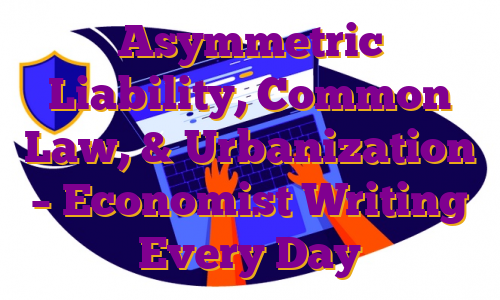Tort law is interesting. You can argue that someone harmed you, and you can cite almost no legislation in the process. Torte law in the US uses case law – the precedent set by previous rulings in the context of social norms. But, what cases did the early cases cite? They also cited earlier cases and social norms, though we may no longer have a record. The beauty of tort law it allows for changing relative costs in prudence and negligence.
Can you imagine a legislature attempting to codify the appropriate amount of neglect by, say, a painter? The standards would quickly go out of date. The relative cost of resources including labor, communications, materials, and the price differences among competitors of differing quality all change over time. Multiply these factors by 20 and then again by the number of occupations and regions in a country. You will quickly see that legislating the appropriate degree of prudence and neglect through congress is a fool’s errand. The challenge is too complicated and the world changes too quickly. In fact, attempting to legislate definitions for neglect and prudence could even backfire and result in regulatory arbitrage, which occurs when firms comply with de jur rules while avoiding them de facto.*
Externalizing Costs
Economists treat externalities as symmetrical. That means that the costs imposed run both ways. Does a yodeler impose upon his meditating neighbors? Or do they impose silence on the yodeler? We may have moral intuition or strong feelings about who should get their way. But economic theory reasons that the costs are symmetrical. The two parties have a conflict of visions and they would like to impose their way on the other – preferably at a low cost.
Sometimes, courts get involved when the two parties cannot resolve the issue otherwise. We can imagine, though it may seem somewhat silly, people suing one another over noise or over verbal harassment about noise. Another more substantial case might be after a homeowner finishes some landscaping, altering the drainage patterns, and causes his neighbor’s basement to flood. Now we’re talking about substantial costs. And while a noise ordinance may exist, there may not be an explicit ordinance addressing drainage and landscaping. A court will refer to case law and precedent.
One reason that the yodeling and the drainage examples are easy to understand is that they are cases of negative externalities. One person imposes costs on a second person without consent. Culture and courts determine whether the cost is appropriate. Culture says that children playing loudly outside is typically fine. Courts say that children’s music that vibrates the neighbor’s house is not fine.
Asymmetric Before the Law
Property rights are a funny thing. If I impose costs upon you and your property without your consent, then you may successfully re-impose those costs upon me by taking me to court and receiving a favorable ruling. In economic jargon we say that you are forcing me to ‘internalize’ my costs, rather than externalize them upon you. They’re my costs, you argue, and I should have to keep them.
But positive externalities are a whole different ballgame according to most people’s moral intuition and according to courts. Say that your basement floods frequently such that your home would sell for $150k. After I complete some landscaping that changes the drainage patterns, your basement stops flooding and your house would sell for $180k. That’s a positive externality that I have imposed upon you without your consent. Indeed, if it was important for me to internalize my costs, why not require me to internalize my benefits. There is no need to go to court – you can just transfer me money in order to ensure that my benefits stay with me. Pivotally, why can’t I sue you for the value that I imposed upon you? Indeed, you’d be no worse off if I were able to win back the entire sum of my benefits that I imposed upon you.
What gives? We can sue due to negative externalities but not due to positive ones. Why the heck not? In either case we can have non-consent and negligence. But in only one of the cases will a lawsuit be entertained by the court. From a strict economic perspective, the asymmetry is puzzling – at first anyway.
Consider the Alternative.
Humans are social creatures. It’s not that we want to get along with one another. It’s more that we require each other in order to enjoy the standard of living that we desire. Think of economies of scale, gains from trade, and agglomeration. These all go out the window if we live far apart from one another. Suing people due to their negative externalities is how we handle being close to others. We don’t necessarily want to be near others and all of their activities. But the list of benefits entices us.
Being able to sue someone for their negative externalities ameliorates the problems that emerge from divergent preferences and the challenges of crowding. It allows for greater population density and all of the accompanying benefits. Suing for externalized benefits would at least impose a transaction cost upon others. It would also incentivize us to keep a little more distance from our neighbors. Part of the moral aversion relates to action. Someone could be sued as a result of being a passive receiver of benefits. The only way to avoid benefits would be to increase the distance between us and lose the benefits of urbanization.
Imagine if your neighbor could sue you after renovating his house and, consequently, increasing the value of yours. It seems entirely just (symmetrical?) that he keep the benefits that he negligently imposed upon you without your consent. But being able to sue someone in this manner doesn’t resolve a social ill – at least not one that we want resolved. Human institutions and rules emerge to address conflict and challenges. Of course, I would love, love, love to impose transfers in order to internalize all of my externalized benefits. If I could do it at zero cost, then the world would be a better place. I’d engage in more other-benefiting activities that I currently forego due to lack of internalized benefits.
But, the world being what it is, there are transaction costs. Going to court can get expensive fast. Being able to sue for negligent, non-consensual, externalized benefits could add to the costs of population density (and probably would). Our challenge is how to live near each other. Introducing additional costs to doing so aggravates rather than ameliorates the problem. To a degree, we have our legal system to thank for urbanization. A seemingly arbitrary difference in how we handle negative and positive externalities pushes us to get together, if not to get along.
*I am not a legal scholar. Please excuse my lack appropriate vocabulary.
Like this: Loading…
Related


